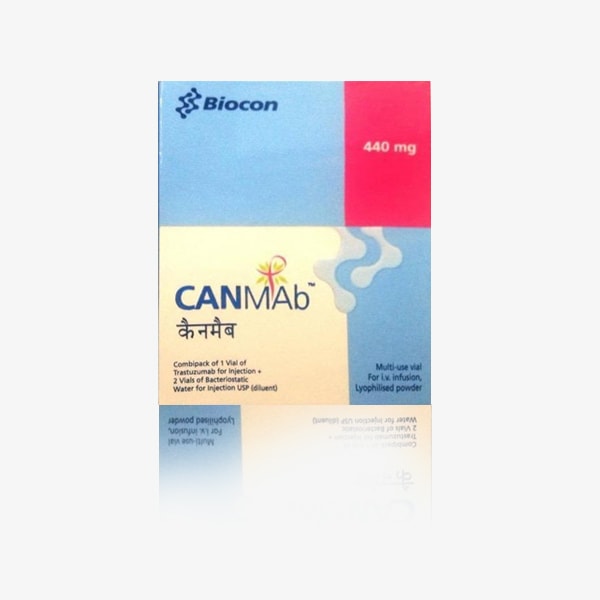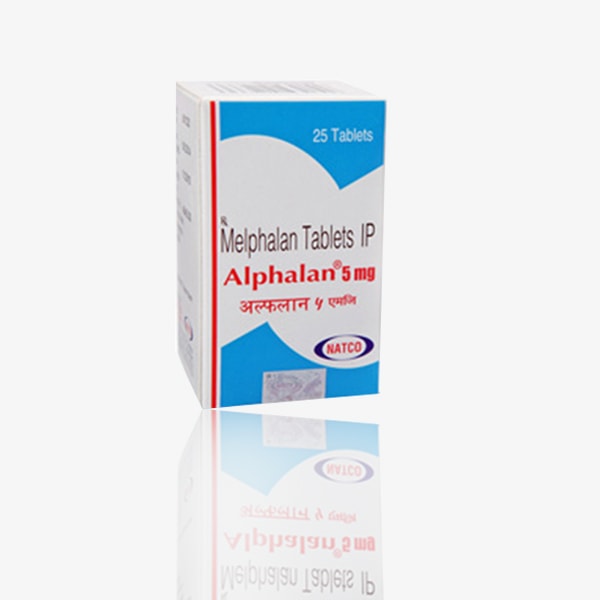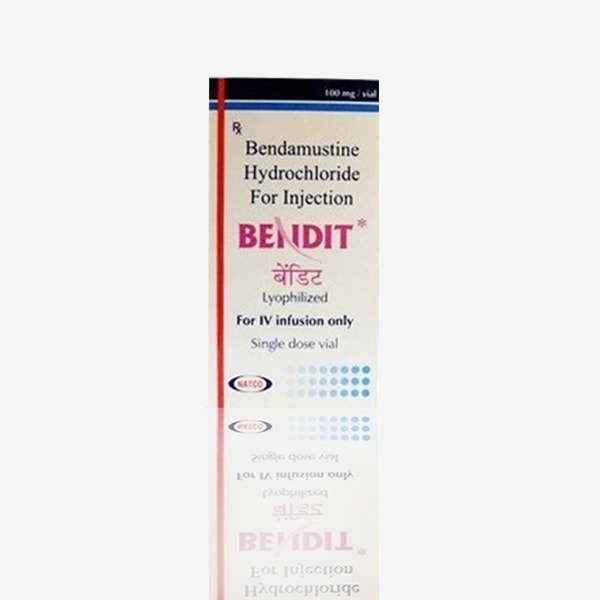

Buy Canmab : Trastuzumab 440 Mg Injection Online
$366.40
Brand Name : Canmab
Composition : Trastuzumab
Manufactured by : Biocon Pharma Ltd.
Strength : 440 mg
Form : Injection
Packing : Pack of 1 Vial with lyophilised powder and 1 vial with Solvent

Buy Canmab : Trastuzumab 440 Mg Injection Online
$366.40
- Description
- Reviews (0)
Description
Description
Description: Canmab, the trade name for Trastuzumab, is a groundbreaking monoclonal antibody designed to target and inhibit the overexpression of HER2 (Human Epidermal Growth Factor Receptor 2) in certain cancers. Manufactured to the highest standards, Canmab is administered as an intravenous injection and has become a cornerstone in the treatment of HER2-positive breast cancer.
Indications: Canmab is primarily indicated for the treatment of HER2-positive breast cancer. It is often used in combination with other chemotherapy agents or as a standalone therapy, depending on the stage and type of cancer. Additionally, Canmab has shown efficacy in treating metastatic gastric cancer with HER2 overexpression.
Mechanism of Action: The mechanism of action of Canmab lies in its ability to target the HER2 receptor. HER2 is a protein that promotes the growth of cancer cells when overexpressed. Trastuzumab, the active ingredient in Canmab, binds to the HER2 receptor, preventing it from sending signals for cell proliferation. This dual action of inhibiting HER2 and triggering an immune response against cancer cells contributes to the therapeutic efficacy of Canmab.
Benefits:
- Improved Survival Rates: Canmab has demonstrated significant improvements in both disease-free and overall survival rates in patients with HER2-positive breast cancer.
- Reduced Risk of Recurrence: Canmab is known to lower the risk of cancer recurrence, particularly in early-stage breast cancer.
- Enhanced Response to Chemotherapy: When used in combination with chemotherapy, Canmab has shown synergistic effects, leading to a more robust response to treatment.
- Quality of Life: By effectively targeting cancer cells while sparing normal cells, Canmab helps maintain or improve the quality of life for patients undergoing treatment.
How to Use: Canmab is administered through intravenous infusion by a qualified healthcare professional. The infusion should be carried out in a clinical setting equipped to handle any potential adverse reactions. The duration of the infusion and the frequency of administration depend on the specific treatment regimen prescribed by the oncologist.
Administration: Canmab is strictly administered as an intravenous infusion, usually over a period of 30 to 90 minutes. The healthcare provider will determine the appropriate dosage and infusion schedule based on the patient’s medical history, overall health, and the specific cancer being treated. Patients are typically monitored during and after the infusion for any signs of adverse reactions.
Dosage: The recommended dosage of Canmab is 440 mg administered as an initial loading dose, followed by maintenance doses. The frequency and duration of maintenance doses will be determined by the treating physician. The dosage may vary depending on the specific cancer type, stage, and treatment plan.
Efficacy: Clinical studies have consistently demonstrated the efficacy of Canmab in improving outcomes for patients with HER2-positive breast cancer. The drug has shown substantial benefits in terms of response rates, progression-free survival, and overall survival. Its role in combination with standard chemotherapy regimens has become standard practice in many oncology settings.
Storage: Canmab should be stored in accordance with the manufacturer’s guidelines and healthcare regulations. Generally, it is recommended to store Canmab vials in a refrigerator at a temperature between 2°C to 8°C (36°F to 46°F). The drug should be protected from light and should not be frozen. Healthcare providers should check the product information for specific storage details.
Side Effects: While Canmab is generally well-tolerated, like any medication, it may cause side effects. Common side effects include nausea, fatigue, fever, headache, and infusion-related reactions. Serious but rare side effects may include cardiac dysfunction and infusion-related hypersensitivity reactions. Patients are advised to promptly report any unusual or severe side effects to their healthcare provider.
Precautions: Certain precautions should be taken into consideration when using Canmab:
- Cardiac Monitoring: Due to the potential risk of cardiac dysfunction, patients may undergo cardiac monitoring before and during treatment.
- Infusion Reactions: Pre-medication with antihistamines and corticosteroids is often recommended to minimize the risk of infusion-related reactions.
- Pregnancy and Breastfeeding: Canmab may pose risks to a developing fetus, and its use during pregnancy should be carefully considered. Breastfeeding is generally not recommended during treatment.
Contraindications: Canmab is contraindicated in patients with a known hypersensitivity to trastuzumab or any other components of the formulation. Additionally, caution should be exercised in patients with pre-existing cardiac conditions, and a thorough assessment of risks and benefits should be conducted before initiating treatment.
In conclusion, Canmab (Trastuzumab) 440 Mg Injection stands as a beacon of hope in the treatment landscape of HER2-positive breast cancer. With its targeted mechanism of action, proven efficacy, and careful administration, Canmab continues to make significant contributions to the advancements in cancer therapy, providing patients with a chance for improved outcomes and a better quality of life. As with any medical intervention, discussions between healthcare providers and patients are crucial to tailor the treatment plan to individual needs, ensuring the best possible outcomes in the fight against cancer.
Reviews (0)
Be the first to review “Buy Canmab : Trastuzumab 440 Mg Injection Online” Cancel reply
Related Products
Buy Alphalan : Melphalan 5 Mg Tablets Online
Total Sales: 0
SKU: 843883
Buy Bendit : Bendamustine 100 Mg Injection Online
Total Sales: 0
SKU: 936597
Buy Pemnat : Pemetrexed 100 Mg Injection Online
Total Sales: 0
SKU: 567374
Buy Pemnat : Pemetrexed 500 Mg Injection Online
Total Sales: 0
SKU: 554986
Buy Abretone : Abiraterone 250 Mg Tablets 120'S Online
Total Sales: 0
SKU: 515693
Buy Alphalan : Melphalan 5 Mg Tablets Online
Total Sales: 0
SKU: 843883
Buy Bendit : Bendamustine 100 Mg Injection Online
Total Sales: 0
SKU: 936597
Buy Pemnat : Pemetrexed 100 Mg Injection Online
Total Sales: 0
SKU: 567374
Buy Pemnat : Pemetrexed 500 Mg Injection Online
Total Sales: 0
SKU: 554986
Buy Abretone : Abiraterone 250 Mg Tablets 120'S Online
Total Sales: 0
SKU: 515693
Buy Alphalan : Melphalan 5 Mg Tablets Online
Total Sales: 0
SKU: 843883
Buy Bendit : Bendamustine 100 Mg Injection Online
Total Sales: 0
SKU: 936597
Buy Pemnat : Pemetrexed 100 Mg Injection Online
Total Sales: 0
SKU: 567374








Reviews
There are no reviews yet.